Overview
Pakistan’s economy depends heavily on the poultry sector because poultry feed industry in Pakistan employs thousands of people and supplies millions of people with inexpensive protein. Poultry feed, the key product that guarantees the healthy growth of poultry and the production of high-quality meat and eggs, is at the center of this industry. However, the production and distribution of poultry feed are taxable in Pakistan, just like any other commercial enterprise.
Feed mills, suppliers, and poultry farmers have been impacted by the substantial changes in tax laws in recent years. Comprehending the tax system is crucial for farmers, distributors, and manufacturers of poultry feed in order to maintain compliance and control expenses. With straightforward, understandable language, this article will walk you through Pakistan’s poultry feed tax system, including sales tax, income tax, withholding tax, and provincial taxes.
Poultry Feed Sales Tax
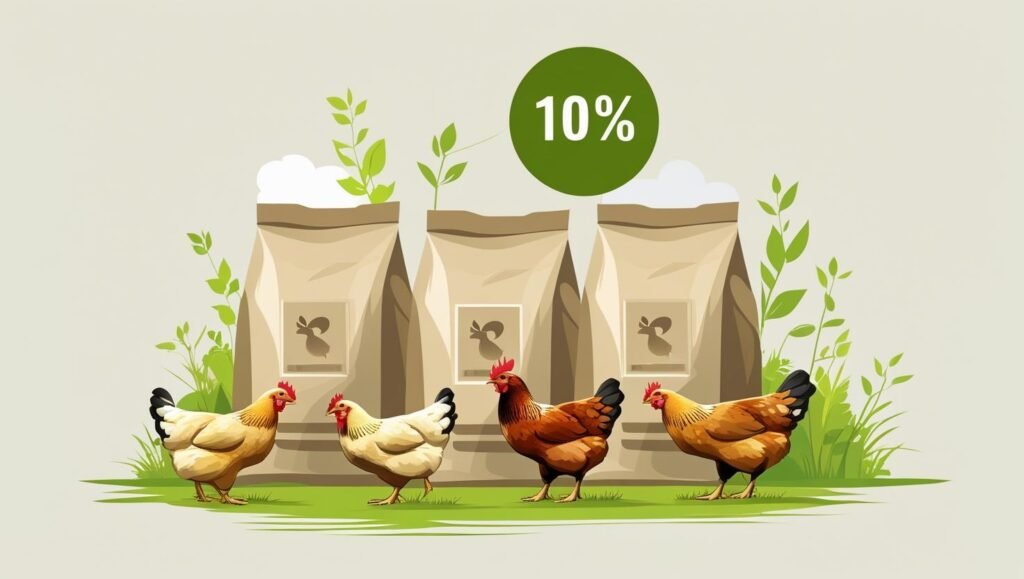
The Present Sales Tax Situation of Poultry Feed
Prior to 2024, the Sixth Schedule of the Sales Tax Act exempted poultry feed from sales tax. However, the exemption was eliminated following the Finance Act of 2024. Due to its inclusion in the Eighth Schedule, poultry feed is now subject to a 10% reduced tax rate.
Important takeaway: Manufacturers and retailers are now required to levy sales tax on each sale, meaning that poultry feed is no longer tax-free.
Rate of Output Sales Tax
Poultry feed is currently subject to a 10% output sales tax rate. Even though this is less than the typical 18% rate for many other goods, it still affects poultry farmers’ final costs.
Adjustment for Input Tax
Many of the ingredients in poultry feed, such as some grains and plant-based raw materials, are still exempt from sales tax even though the feed is taxable. Nonetheless, certain inputs are subject to taxes, such as imported medications and additives.
Input tax credits are available to manufacturers for the taxable goods they buy. This lowers their total tax obligation.
The Need to Register for Sales Tax
The Federal Board of Revenue (FBR) requires sales tax registration from any company that deals in taxable supplies, including poultry feed. Feed mills that import additives or medications must also register. Due to their import operations, many mills were required to register for sales tax even before poultry feed became taxable.
Section 8B Limitation
Feed mills are permitted to claim input tax up to 90% of their output tax for each tax period under Section 8B of the Sales Tax Act. The payable tax amount is typically determined on the limited taxable portion of purchases because the majority of inputs are exempt.
Additional Sales Tax on Unregistered Purchasers
A feed mill may be subject to additional taxes if it sells poultry feed to unregistered purchasers, as is the case with many poultry farmers. The application may change based on legal developments because this issue is presently being considered by the courts.
Income Tax on Poultry Feed Businesses
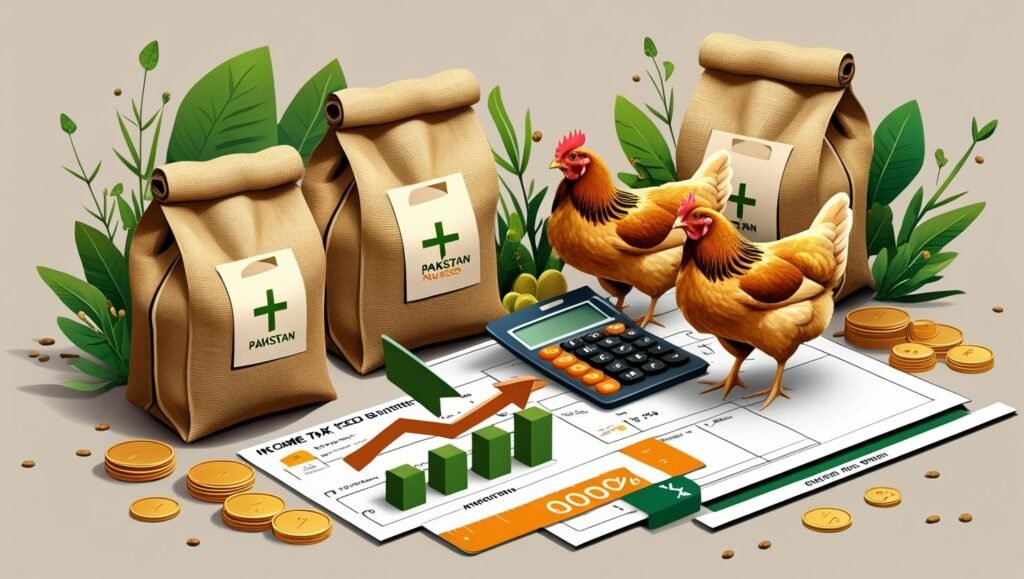
Income Subject to Taxation
Every poultry feed company is required to pay income tax on its taxable income, which is the sum that remains after subtracting allowable business expenses from total sales.
Rate of Corporate Taxation
The higher of the following is the income tax rate for businesses in Pakistan:
• 0.75% of yearly turnover (minimum tax under Section 113)
• 29% of taxable income
• 17% of accounting profit
This guarantees that a business will still pay a minimum tax based on turnover even if it reports low profits.
Individual and AOP Income Tax Rates
Instead of using a flat corporate rate, the tax is determined using progressive income tax slabs if the poultry feed company is operated as an Association of Persons (AOP) or as a sole proprietorship (individual).
The following is applicable for Tax Year 2026:
Income tax rates range from 0% for the lowest income bracket to 45% for the highest; individuals and AOPs pay income tax based on their taxable income after allowable expenses; and if declared profits are extremely low in relation to sales, a minimum tax of 0.5% of turnover under Section 113 may be applicable.
Tax Withholding Requirements
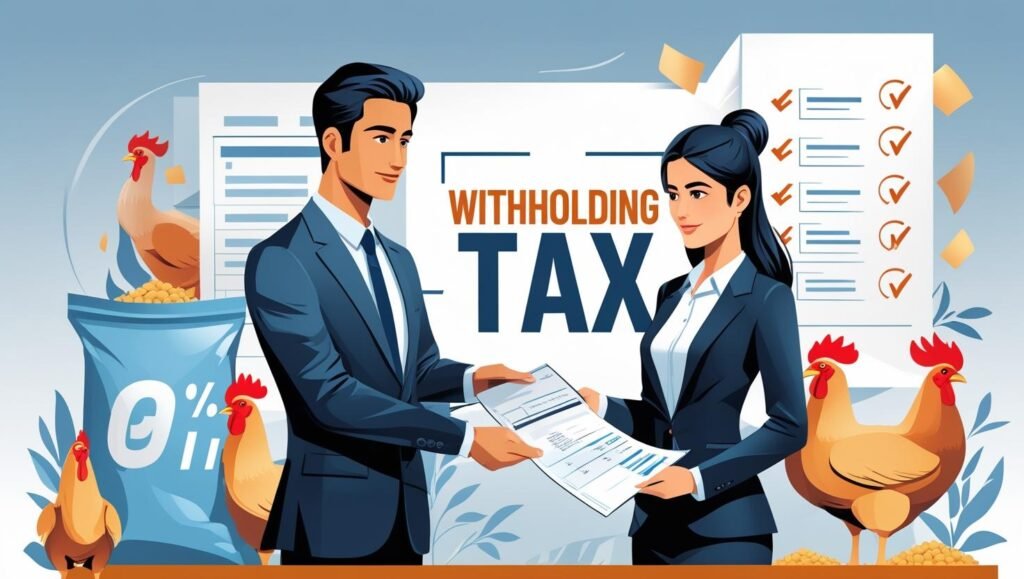
Buying from Approved Vendors
Withholding tax is typically applied when buying from a registered supplier, unless the supplier has an exemption certificate.
• A copy of the Goods Declaration (GD) and an undertaking are included with the purchase, which comes from a commercial importer who sells in the same condition.
• If the farmer has registered their information with the commissioner, the purchase is from the farmer.
Purchases from Unregistered Suppliers
A feed mill will withhold tax under section 153 at the rate of 4% – 10% on purchases and services if from un-registered persons but tax on brokerage will be applicable if purchased through brokers.
Exemption of withholding will be available if purchased from supplier having Exemption certificate or from commercial importer if he supplied in same condition along with copy of GD and undertaking. Purchases from farmer will also be exempt form withholding tax if farmer had duly provided his information to the Commissioner.
Sales to Withholding Agents (e.g., companies, AOPs)
Most of the sale of feed mills are to Poultry farmers, who are not withholding agents. However if sales are made to withholding agents WHT will be applicable. If the mill is intended to make sales to withholding agents then exemption certificate may be obtained from commissioner.
Provincial Tax Requirements
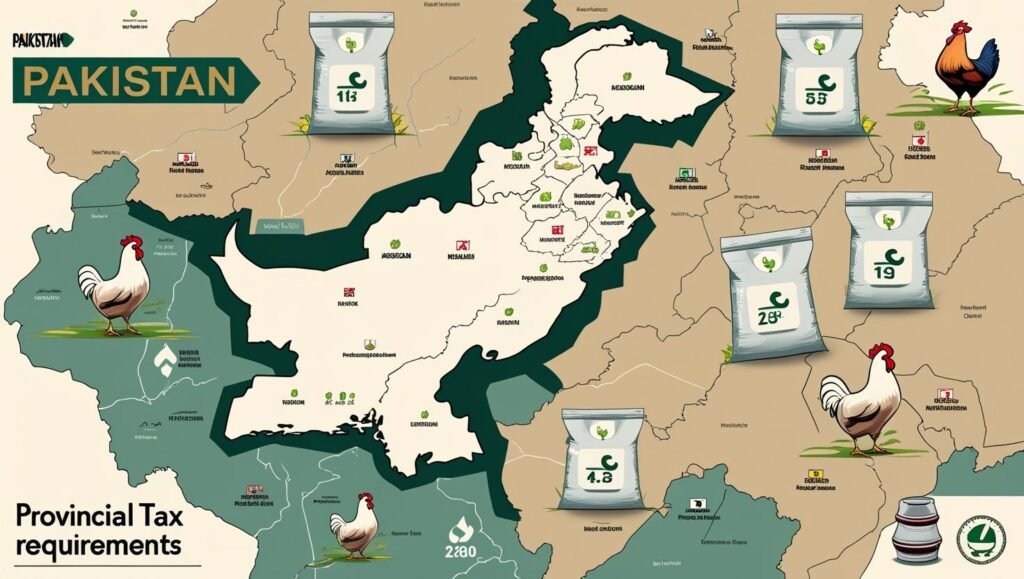
The Punjab Revenue Authority (PRA)
Since the production of poultry feed is not a service, PRA registration is typically not necessary. A feed mill must, however, register with the Punjab Revenue Authority as withholding agent if it hires taxable services.
How Tax Changes Affect the Poultry Feed Sector
Rising Expenses for Farmers
Poultry farmers now face higher production costs as a result of the sales tax on poultry feed, which may eventually have an impact on the market price of chicken eggs and meat.
Feed Mill Compliance Requirements
Feed mills now have more compliance obligations, such as registering for sales tax, submitting monthly returns, and creating accurate invoices. Serious penalties may be imposed for noncompliance.
Potential Legal Assistance
There is still a chance that some relief will be given in the future because some aspects, like the additional tax on sales to farmers, are being reviewed by the court. Companies should keep abreast of legal developments.
Useful Advice for Poultry Feed Companies
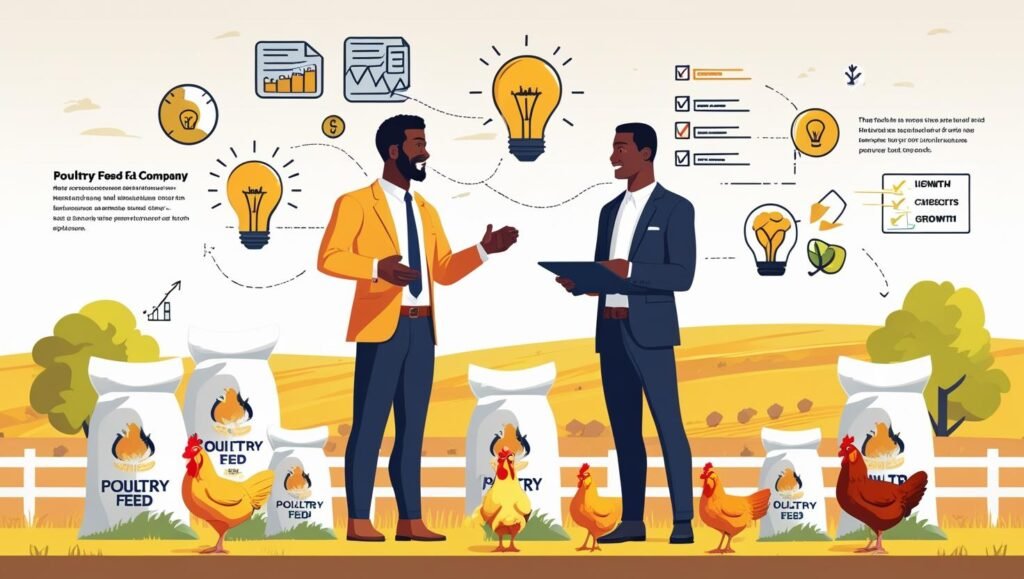
1. Obtain Correct Registration: Verify that your feed mill is properly registered for both income and sales taxes.
2. Keep Accurate Records: Ensure that all invoices, GD copies, and exemption certificates are kept in order.
3. Claim Eligible Input Tax: Make sure you don’t overlook any input tax credits for purchases that are subject to taxes.
4. Keep an eye on court rulings: Your pricing strategy may be directly impacted by the resolution of the upcoming tax case.
5. Consult a Tax Expert Professional advice is strongly advised due to the intricacy of the tax laws.
Conclusion
The Finance Act 2024, which imposed a 10% sales tax on poultry feed, significantly altered Pakistan’s taxation of this product. Even though the lower rate is less than the typical 18%, feed mills and poultry farmers are still under financial strain. The administrative and financial burden is further increased by income tax, withholding tax, and potential provincial taxes.
Complying with these tax laws and controlling expenses require an understanding of them. Poultry feed companies can more successfully negotiate this shifting tax environment by maintaining accurate records, claiming all available input tax credits, and keeping abreast of court rulings.